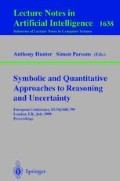Abstract
A popular approach to explanations amounts to backward chaining over logical implications encoding causal links. However, the resulting explanations are often unsatisfactory from a common-sense point of view. We define a framework allowing us to distinguish causal implication from mere logical implication. Causal explanations are then deduced through two inference schemes so that explaining is in some way “less than implying” and “more than implying”. Finally, we show how our approach applies to diagnostics.
Access this chapter
Tax calculation will be finalised at checkout
Purchases are for personal use only
Preview
Unable to display preview. Download preview PDF.
References
A. Aliseda. Seeking Explanations: Abduction in Logic, Philosophy of Science and Artificial Intelligence. PhD thesis, Stanford University, Department of Computer Science, 1998.
P. Besnard and M.-O. Cordier. Explanatory diagnoses and their characterization by circumscription. Annals of Mathematics and Artificial Intelligence, 11:75–96, 1994.
V. Brusoni, L. Console, P. Terenziani, and D. Theseider Dupre. Characterizing temporal abductive diagnosis. In Proc. of the Int. Workshop on Principles of Diagnosis (DX’95), pages 34–40, Goslar (Germany), 1995.
M. Cialdea-Mayer and F. Pirri. Abduction is not deduction-in-reverse. IGPL, 4:1–14, 1996.
L. Console and D. Theseider Dupré. Abductive reasoning with abstraction axioms. In Foundations of Knowledge Representation and Reasoning, pages 98–112, 1994.
L. Console and P. Torasso. Heuristic and causal reasoning in check. In J.-P. Krivine, J.M. David, R. Huber and C. Kulikowski, editors, IMACS Transactions on Scientific Computing, Paris, 1988.
L. Console and P. Torasso. Hypothetic reasoning in causal models. Intelligent Systems, 5(1):83–124, 1990.
L. Console and P. Torasso. A spectrum of logical definitions of model-based diagnosis. Computational Intelligence, 7(3):133–141, 1991.
M.-O. Cordier. When abductive diagnosis fails to explain too precise observations. In Proc. of the Int. Workshop on Principles of Diagnosis (DX’98), pages 24–31, Cape Cod (USA), 1998.
H. A. Kautz. A Formal Theory for Plan Recognition. PhD thesis, University of Rochester, Department of Computer Science, 1987.
V. Lifschitz. On the logic of causal explanation. Artificial Intelligence, 96:451–465, 1997.
J. Lobo and C. Uzcátegui. Abductive consequence relations. Artificial Intelligence, 89:149–171, 1997.
W. Nedjl and J. Gamper. Harnessing the power of temporal abstractions in model-based diagnosis of dynamic systems. In Proc. of the European Conference on Artificial Intelligence (ECAI), pages 667–671, Amsterdam, 1994.
D. Poole. Explanation and prediction: An architecture for default and abductive reasoning. Computational Intelligence, 5(1):97–110, 1989.
D. Poole. A methodology for using a default and abductive reasoning system. Intelligent Systems, 5(5):521–548, 1990.
M. Porcheron and B. Ricard. An application of abductive diagnosis methods to a real-world problem. In Proc. of the Int. Workshop on Principles of Diagnosis (DX’97), pages 87–94,Mont-Saint-Michel (France), 1997.
C. Preist. Abduction using disjunctive causal models. In Proc. of the Int. Workshop on Principles of Diagnosis (DX’94), pages 242–251, New Paltz (NY), 1994.
J. A. Reggia, D. S. Nau, and P. Y. Wang. Diagnostic expert systems based on a set covering model. Man-Machine Studies, 19(5):437–460, 1983.
C. Sakama and K. Inoue. On generality in abduction and induction. In ECAI Workshop on “Abduction and Induction in AI”, Brighton, 1998.
A. ten Teije and F. van Harmelen. An extended spectrum of logical definitions of diagnosis. In Proc. of the Int. Workshop on Principles of Diagnosis (DX’94), pages 334–342, New Paltz (USA), 1994.
Author information
Authors and Affiliations
Editor information
Editors and Affiliations
Rights and permissions
Copyright information
© 1999 Springer-Verlag Berlin Heidelberg
About this paper
Cite this paper
Besnard, P., Cordier, MO. (1999). Inferring Causal Explanations. In: Hunter, A., Parsons, S. (eds) Symbolic and Quantitative Approaches to Reasoning and Uncertainty. ECSQARU 1999. Lecture Notes in Computer Science(), vol 1638. Springer, Berlin, Heidelberg. https://doi.org/10.1007/3-540-48747-6_6
Download citation
DOI: https://doi.org/10.1007/3-540-48747-6_6
Published:
Publisher Name: Springer, Berlin, Heidelberg
Print ISBN: 978-3-540-66131-3
Online ISBN: 978-3-540-48747-0
eBook Packages: Springer Book Archive

